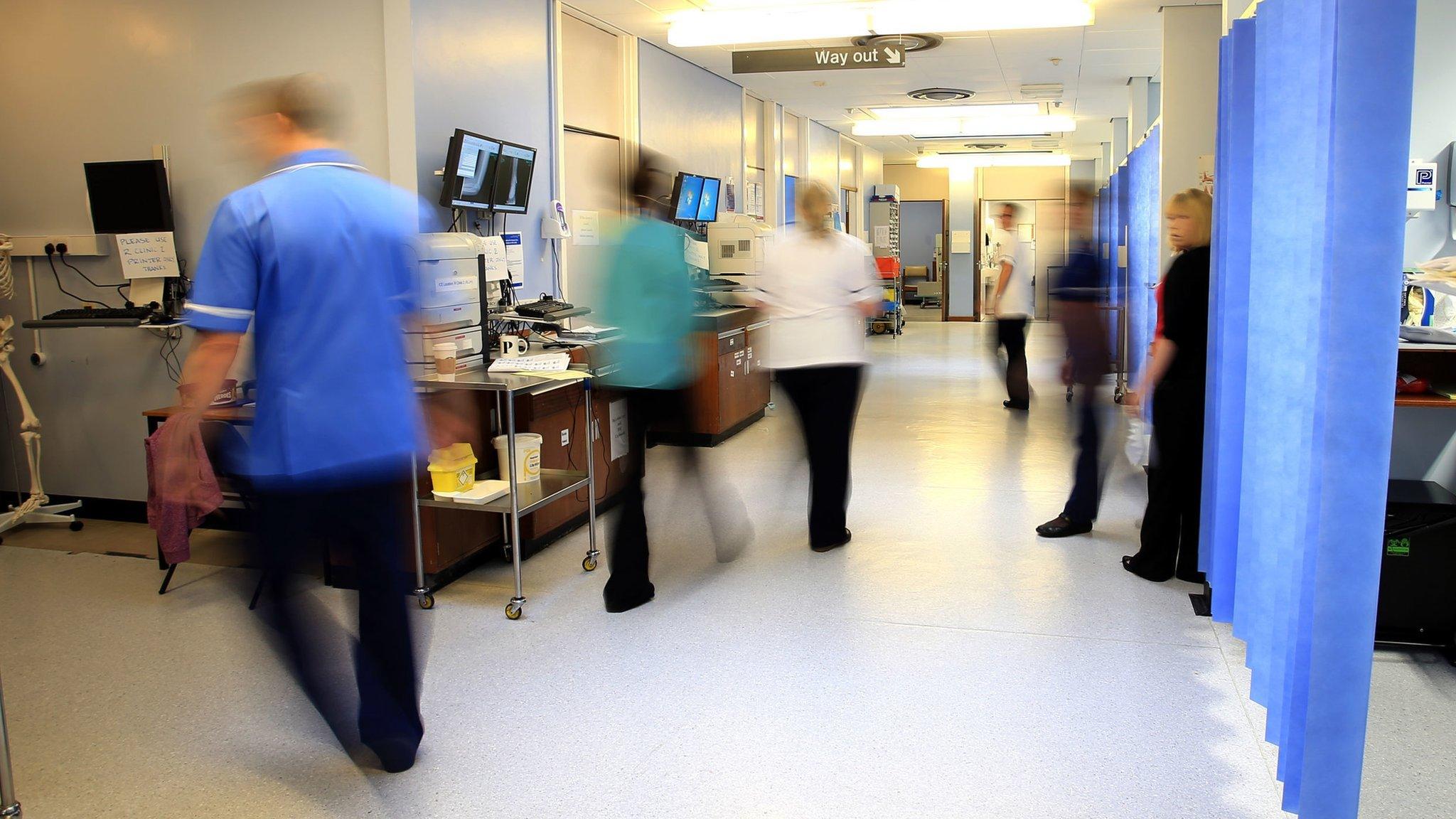Humza Yousaf: I don't have more money for NHS pay deals
- Published
The health secretary says strikes are not inevitable
Scotland's health secretary has warned he does not have more money for pay deals despite the threat of strike and industrial action across the NHS.
Humza Yousaf also told BBC Scotland that contingency talks had taken place with the Ministry of Defence.
He was speaking after GMB Scotland confirmed ambulance service workers will stage a 26-hour strike later this month.
The latest deal is for a flat rate of £2,205 per person backdated to April.
But unions, including the Royal College of Nursing (RCN), have called for an enhanced deal that reflects the pressures facing households due to the cost of living crisis, which has been caused by rising energy bills and soaring food prices.
The health secretary and his Welsh counterpart have written to the UK Health Secretary Steve Barclay to ask for more funding to help avert strike action this winter.
But in response the UK government said "record amounts" were being invested in health and social care.
Asked if he would find more cash to stop the strikes, Mr Yousaf told the The Sunday Show: "I don't have more money."
The health secretary confirmed he would consider redistributing the £480m set aside for NHS staff and admitted the demands of trade unions were "not unreasonable" given soaring inflation.
On the prospect of action, he said: "I don't for a minute think that strikes are inevitable.
"We will be getting back round the table, not just with the RCN, but with the other health trade unions.
"I believe trade unions also think that a strike is not inevitable. We will have to negotiate."
Mr Yousaf also told the programme the UK government had a "moral obligation" to give the Scottish government more money.
He added: "They are the architects of this cost crisis."
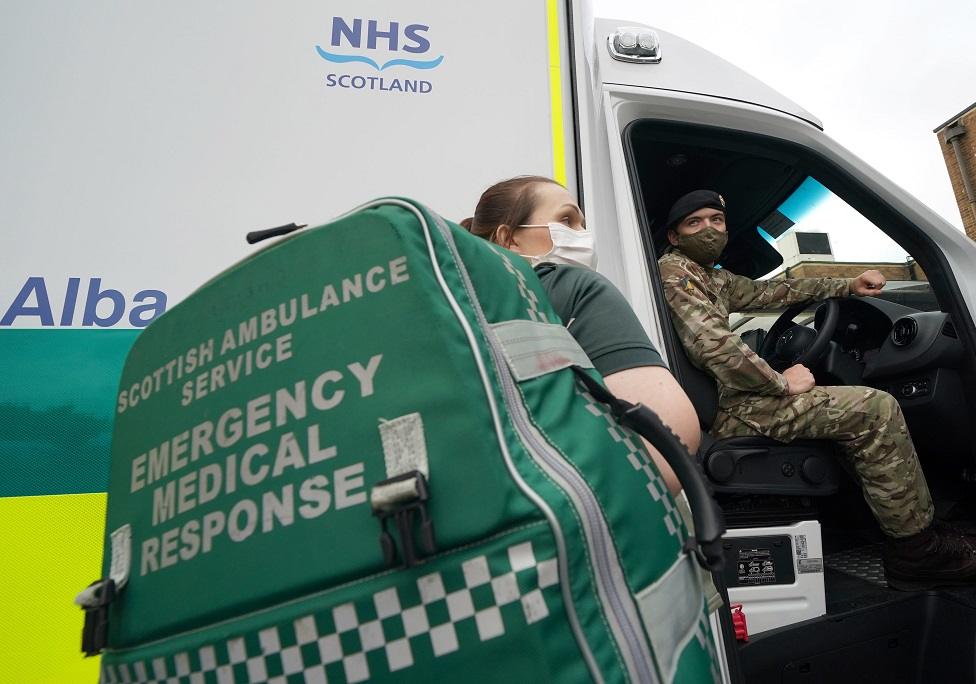
Soldiers were drafted in to drive ambulances in parts of Scotland last year to alleviate pressure on the NHS during the pandemic
Mr Yousaf also said contingency talks had been held with the other emergency services and the MoD.
But he stressed enlisting military support for the NHS would be the "extremist option".
Mr Yousaf said: "They have rightly said that the threshold for any MACA (Military Aid to Civil Authorities) support would be extremely high."
In September 2021 soldiers were drafted in to help drive non-emergency Scottish Ambulance Service vehicles, as well as help in Covid testing centres.
The military assistance ended in March this year.
Following the joint letter from the Scottish and Welsh governments calling for more funding, a UK government spokesperson said: "We are investing record amounts in health and social care and the chancellor has been clear that protecting public services like the NHS is a priority.
"We are hugely grateful for the hard work of NHS staff, including nurses, and that's why we accepted the recommendations of the independent NHS Pay Review Body in full and have given over one million NHS workers in England a pay rise of at least £1,400 this year.
"This is on top of a 3% pay increase last year when public sector pay was frozen and wider government support with the cost of living."
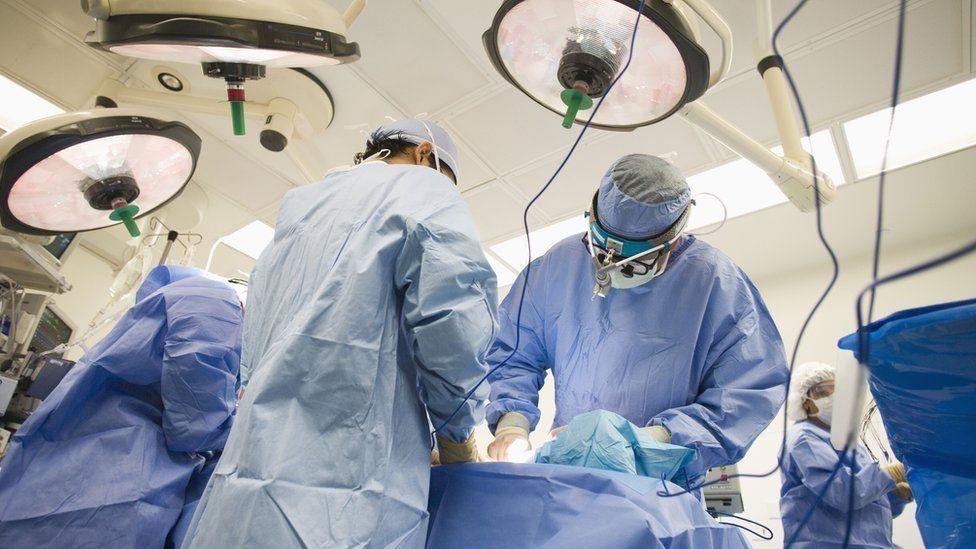
On Saturday GMB Scotland confirmed its members will take action from 06:00 on 28 November to 07:59 the following day.
The union said urgent meetings were being sought with management to ensure appropriate staffing levels for critical care.
The NHS is already under huge pressure and last week Scottish hospitals recorded their worst ever accident and emergency waiting times.
Meanwhile, Audit Scotland has warned the Scottish government's "price tag" for a new National Care Service, which would make ministers accountable for adult social care, is likely to be significantly understated.
On Friday Unite announced around 1,500 SAS staff, including paramedics, will take industrial action on 25 November.
Royal College of Nursing and health workers in two other unions have also voted for a combination of strike and industrial action over the latest Scottish government pay offer.
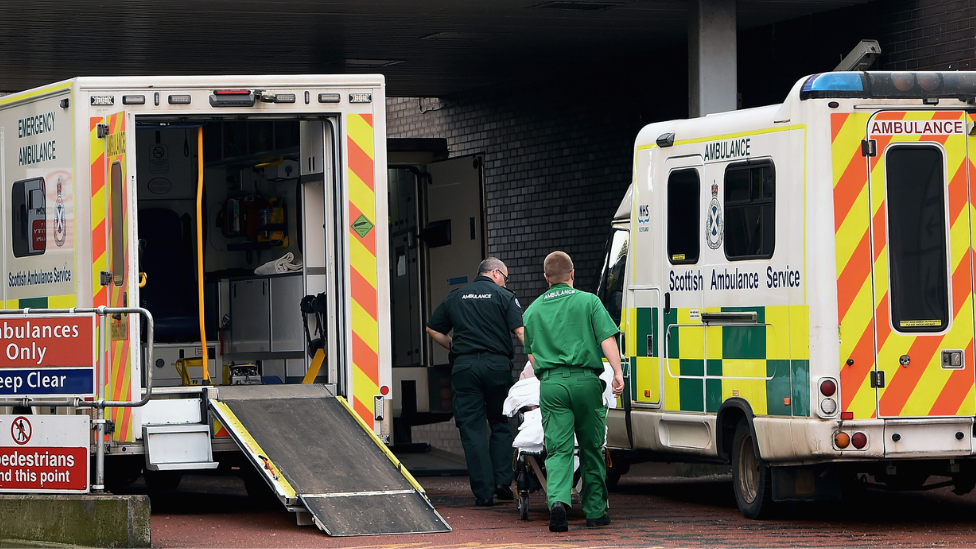
Ambulance workers have backed industrial action
But Unison, Scotland's largest health union, has suspended its strike ballot of NHS staff and is consulting its members on a revised pay offer until Monday.
Unite said all of its Scottish Ambulance Service workers - including advanced practitioners, planners and administrative workers - would take "continuous action short of strike" from 00:01 on 25 November.
This is likely to take the form of measures such as work-to-rule and an overtime ban.
GMB announced its dates on Saturday after 89% of its SAS members voted for strikes earlier this month.
It is the first major strike to be confirmed across the UK in the current wave of disputes affecting the NHS.
And if it goes ahead it will be the first to affect the ambulance service since 1990.
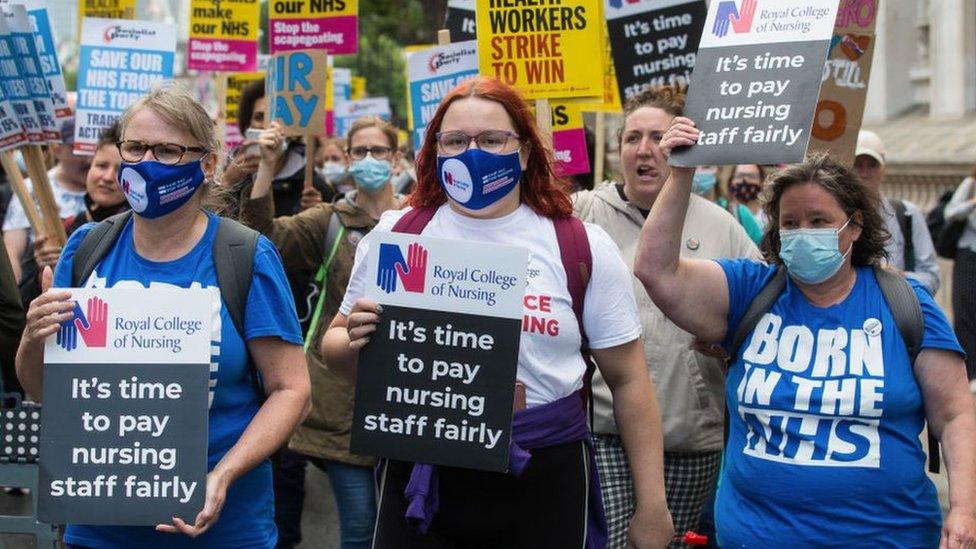
Members of the Royal College of Nursing have also rejected the Scottish government's revised pay offer
Scottish Conservative health spokesman Dr Sandesh Gulhane warned frontline NHS staff were "facing some of the worst conditions in living memory".
He added: "Humza Yousaf says he is listening to our frontline healthcare workers and has promised to listen to social care staff over his misguided National Care Service plans - yet if he was, we wouldn't be facing catastrophic strikes and the National Care Service would be scrapped."
And Scottish Labour health spokeswoman Jackie Baillie said Mr Yousaf had "lost the confidence of health workers".
She added: "The health secretary is hopelessly out of his depth, unable to provide basic information on when he'll next meet with the unions to avert strike action and what contingency plans are in place, if the strikes go ahead."
Finance Secretary John Swinney previously said that although cash had been moved around in the health budget to give NHS staff a better offer, further pay uplifts would mean cuts elsewhere.
Mr Swinney announced £615m of spending cuts in his emergency budget review. It came on top of £560m worth cuts to public services in September.
Last week nurses belonging to the Royal College of Nursing (RCN) voted to strike for the first time in the union's 106-year history.
The RCN said every service in Scotland had supported industrial action, and called on ministers to return to the negotiating table.
Action is expected before the end of the year.
Members of the Chartered Society of Physiotherapy have also backed strike action.
And earlier this month about 2,500 workers in the Unite union voted for industrial action.
Meanwhile, teachers in Scotland will stage a 24-hour walkout on 24 November after voting overwhelmingly to strike in a dispute over pay.
- Published12 November 2022

- Published9 November 2022

- Published8 November 2022
